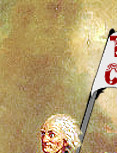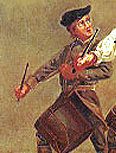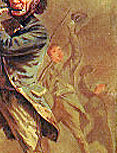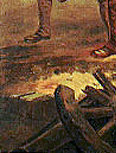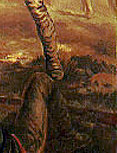By the 1840s, certainly – if not earlier – many
Americans had come to prize and understand order
in a way that clashed with contractual, pragmatic,
or utilitarian views of political institutions.
This is somewhat understandable in a country
where rapid territorial expansion by purchase
and conquest, a revolution in transportation
and communication, and the unbridled power of
a largely unhampered market economy had created,
for many people, a sense of disorientation and
confusion. There was a wild sense of endless
opportunity, but also more issues over which
politicians and emerging interest groups could
come into conflict.
According to Major L. Wilson, expansion
into space (the frontier) and time (the
future) led some Americans to adopt for their
purposes an outlook very similar to what Mircea
Eliade calls "the myth of the eternal return."
That conception had deep roots in pagan, classical
civilization, and had undergone revival in the
civic republicanism of Renaissance writers like
Nicol˛ Machiavelli, whence it trickled into
the American Revolutionary synthesis by way
of English opposition theorists.
In this "myth," a "cosmogonic act" of social creation
is followed by a falling-away or degeneration
from pattern and then, ideally, by a stage of
regeneration or re-founding. This notion helped
the ancients deal with the uncertainty of the
future. While Wilson finds this to be "conservative"
in some sense, he shows that in practice the
doctrine lent itself readily to revolutionary
projects presented as "restoration."
FREE-SOILERS
AND THE CONTROL OF HISTORY
For
a particular Northern political movement, whose
overlap with a particular kind of post-millennialist
Protestantism is worth noting, this reading
of history became both worldview and program.
This was the Free
Soil movement, whose rank and file largely
went into the Republican Party by the later
1850s.
For Free Soilers, the original founding embodied
in the federal Constitution
represented the height of moral and political
perfection. Then, degeneration had crept in,
led by the Southern states with their campaign
of slavery expansion. The solution involved
creating a new political will to stop and reverse
Southern aggression, even at the price of a
new cosmogonic act, or a re-founding.
Violence and revolution-as-restoration was already
implicit in this view. These men were ready
for total war and reconstruction, years before
the first Southern state seceded from the union.
In this crowd, Lincoln was considered a moderate.
The mythic character of this political outlook
seems plain enough. One wonders if the Constitution
was so perfect, after all. The Free Soilers'
pretense that slavery was completely foreign
to the original Constitution struck both the
abolitionist William
Lloyd Garrison and Southern-rights spokesman
John C. Calhoun as unhistorical nonsense. For
them, the Constitution had clearly recognized
slavery, even if they drew different lessons
from the fact.
The essential point is that the Free Soil view
deliberately blurred the difference between
the Declaration
of Independence and the Constitution, claiming
that the latter's purpose was to implement the
former. In truth, the Constitution – perfect
or otherwise – was a fairly practical affair
designed to accommodate differing states with
differing interests.
EMPIRE,
EXPANSION, AND MORAL IMPERIALISM
Now,
my interest in this matter is not slavery, the
expansion of slavery into the western territories,
or the rest of it. My interest is the way in
which the Free Soilers' and Republicans'
view of history contributed to the most violent
possible resolution of the issues on hand in
1860-1861 and then provided a bottomless source
of moral rhetoric for the later US empire. As
Wilson puts it, the Free Soilers' idea of "regenerating
the national ideal involved a 'cultural purge'
which, with the alternative of disunion ruled
out, truly defined the terms of irrepressible
conflict."2
The phrase italicized above underscores, for me,
a certain lack of political creativity prevalent
in 1860-1861. For many Northerners, the federal
union had changed from a means to various
ends, to an end in its own right. The union
had taken on near-religious dimensions. Yet
Americans had once viewed the union as a pragmatic
experiment.3
Had that view lasted longer outside the South,
we might have been spared our bloodiest war.
I mention this in passing, since this is an
antiwar site and I deny that any war
is above criticism.
Leaving aside the question of whether the union
was or was not of transcendent value, what is
interesting is the moral posture taken by its
Savers. Lincoln and his allies claimed to be
working for all Americans, indeed for the future
of all mankind, in their military exertions.
The ideological fallout is still with us. As
Robert
Penn Warren noted, victory in this "civil
war" – one outcome of which was emancipation
– filled up a Treasury of Virtue, which later
US statesmen took as proof of their inexhaustible
righteousness in every succeeding controversy.
A narrow, mythic, self-centered outlook – whatever
its original connection with a good cause, antislavery
was – became a sort of charter for US imperialism,
in the name of imposing universal values. Lincoln's
and Seward's rhetorical bits about houses divided
or "irrepressible" conflicts served later crusaders
well. The world could not remain half slave
and half free, said the Cold Warriors, referring
(apparently) to geography.
Whether the Cold Warriors had any fundamental causal
role in Soviet Russia's collapse seems open
to doubt. On our side of the "iron curtain,"
the Cold Warriors' efforts at centralizing and
militarizing America and its allies did bring
about a world which is, in fact, half socialist
and half free, that is, within countries,
rather than between them. This may illustrate
the perils of believing, in detail, in an inherited
rhetoric.
Criticism of the reigning rhetoric of a successful
imperial power is largely unwanted. In a world
in which there are supposedly always two, and
only two, historical possibilities, one can
be seen as standing with the "other side." You
don't want slavery – or Hitler, or Stalin,
or Fill-in-the-Blank – to come back, do you?
No – of course not, old chaps. But that is
not the same thing as accepting the many myths,
legends, false alternatives, and other claims
on which the legitimacy of the current hegemonic
power rests.
Typically, more is involved in crusades for universal
values than just a sincere interest in the values.
There is, after all, the crusade itself.
If conflicts were always irrepressible, there
would never be any peace. Here indeed is a field
for the would-be critical theorists to look
at, if they should ever take time off from misunderstanding
"globalization."
Notes

